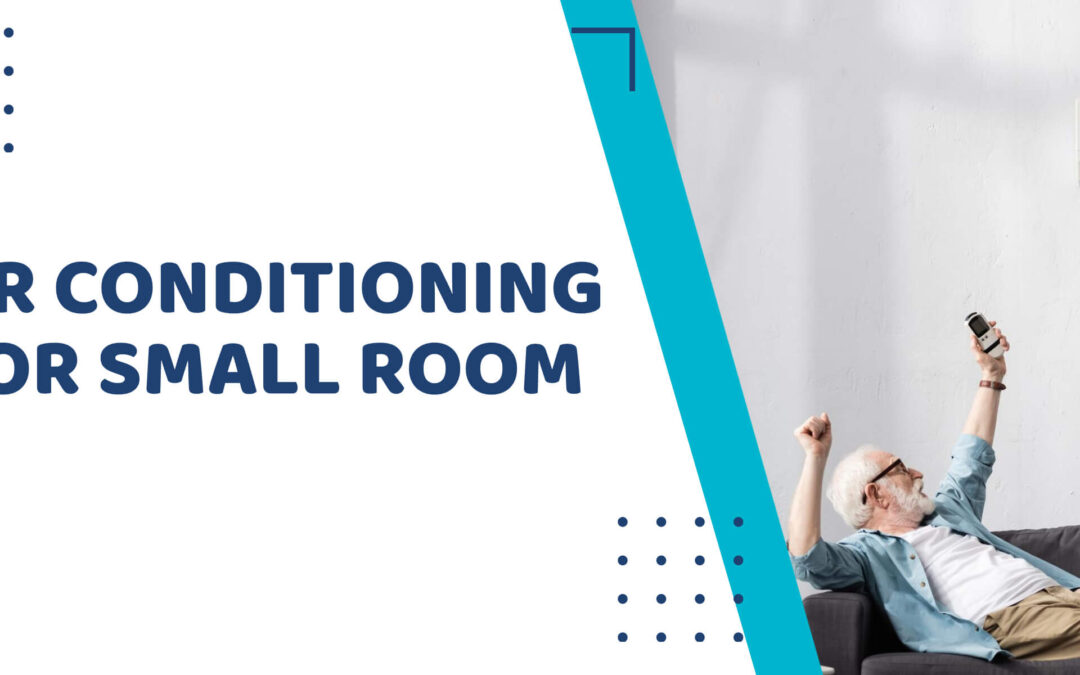If you’re considering purchasing an air conditioner for a small room in your home, you should take the time to do some research. While it’s tempting to buy the biggest, most high-powered AC unit you can fit into the space, especially during summer days when the weather is sweltering, doing so might not be the best choice for either your pocketbook or your power bill.
Choosing the appropriate size of AC for a room ensures optimal cooling performance and energy efficiency. Read on for tips on determining the size of AC you need and to learn about the best types of air conditioners for small spaces.
Why Your AC Has to Be Sized Just Right
Large air conditioners with high cooling capacities consume more energy than smaller units. Apart from wasting power, an oversized AC will cool a small room too quickly, resulting in frequent stops and starts. This adds to your power bill while wearing out your AC.
On the other hand, an AC that is too small might not cool your space effectively. It’s also not energy-efficient, as an undersized AC unit will have to work harder to get the temperature down to a comfortable level. This results in more energy consumption, which is bad for both the environment and your energy bill.
What You Need to Know Before Buying an AC for a Small Room
If you’re looking for an AC for a small space, it’s helpful to have a basic understanding of the factors that professional installers consider when choosing the ideal unit. One of these is cooling capacity.
Cooling capacity refers to the amount of heat an aircon can remove from a room per hour. Worldwide, the standard unit of measurement for an air conditioner’s cooling capacity is British Thermal Units (BTUs). In Australia, however, it’s more common for AC cooling capacity to be measured in kilowatts (kW). One watt is equal to 3.41 BTU/hour.
It’s also important to note that when HVAC professionals refer to the “size” of an air conditioning unit, they aren’t talking about how big or small the appliance is. In the HVAC industry, “size” refers to an aircon’s cooling power.
Factors to Consider
Apart from cooling capacity, there are other factors you should consider when choosing an aircon. These include the following.
Room Size
Before shopping around for ACs, you should complete one crucial step: Calculating the size of the space to be cooled—generally, the bigger the floor space, the higher the wattage you need.
To calculate your room size, multiply the length and the width of the area to be cooled. Next, multiply that number by 160 watts. This will give you a rough estimate of the cooling capacity you need for your space.
Example:
3 meters (length) X 3 meters (width) = 9 m2
9 m2 x 160 watts = 1400 watts
In the above example, 1400 watts or 1.4 kW is needed for cooling capacity. With this information, you’d know that you’d likely need a 1.4 kW/5,000 BTU aircon at the minimum. However, this is not the only factor that should be considered.
Ceiling Height
The simple equation in the previous section applies to rooms with ceilings that are of standard height. However, you’d likely need more cooling capacity if you have high ceilings.
High ceilings have a greater volume of air that needs to be cooled. Ideally, you would have a professional HVAC installer come to your home to make the appropriate measurements and provide you with a more accurate estimate of the wattage you need.
Room Insulation
Insulation materials are another factor to consider. On hot summer days, insulation keeps cooled air in and warm air out.
A poorly insulated room will need a more powerful air conditioner than a well-insulated one. This is because inadequate insulation won’t work as well as it should in maintaining a cool and comfortable indoor temperature.
Number of Occupants
If you’ve ever been in a crowded space with other people for a long time, you’ve probably noticed how hot and stuffy the room quickly got. Humans release body heat, which affects how well your AC works to cool the air. If your room will have more than one occupant, the general rule of thumb is to add 0.1 kW of cooling capacity per additional person.
The Climate
Australia has a wide range of temperatures. For instance, Marble Bar has a scorching climate, while Lithgow in New South Wales has comfortably warm summers and very cold winters.
Generally, a room in a home or place of business located in a dry, cool area requires a smaller air conditioner than one in a hot and humid region. For this reason, it’s best to seek advice or installation services from an HVAC professional familiar with the cooling requirements of homes and offices in your city. The HVAC professional can provide you with AC recommendations based on their experiences with past customers.
Windows
Large, clear windows let in natural light, brightening up a room. Unfortunately, they can also make your AC unit work harder.
In particular, big windows without tint let in a lot of heat light. Additionally, older windows with damaged seals allow cooled indoor air to escape from a room and hot outdoor air to enter. As such, the state of your windows is an important factor in choosing the right size of AC for your space.
Apart from choosing a more powerful AC unit, you should also consider installing blinds or curtains to help keep out some of the light and heat. Another option is to have window seal cracks repaired.
Heat-Generating Appliances
Some household appliances generate heat, further adding to the total heat load of the space to be cooled. For instance, if you’re planning to use the small room as a kitchen, you’ll likely need a more powerful AC to offset the heat generated by your stove, dishwasher and refrigerator. Other appliances that give off head include toasters, water heaters and ovens.
Other Considerations
Energy efficiency
Most modern AC units have inverters. An inverter is an electronic device in the air con unit that efficiently controls the speed of its motor and the flow of the refrigerant. This results in greater energy efficiency, making this type of air conditioner a great option for those who want to save money on energy bills. Because they’re energy-efficient, inverter aircons are also more eco-friendly than non-inverter units.
Humidity
Most air conditioners can remove at least some moisture from muggy indoor air. However, dehumidification is not an aircon’s primary function. If excessive humidity is a concern, you might also want to invest in one or more dehumidifiers as well as an aircon for your space. Used in conjunction with an aircon, dehumidifiers will help make the air in your room feel both cooler and drier.
Best Air Conditioning Options for Small Spaces
There are many types of air conditioners on the market, and choosing which is best for your room can be difficult. To help you with your search, here are some standard air conditioning options ideal for small spaces.
Portable Air Conditioner
This type is generally less expensive than other AC units, and if you only need to cool a small room, this gives great bang for your buck. However, remember that portable aircons are not powerful enough to cool entire homes. Also, the hot air from the unit must be vented out of the room, such as through a window or by cutting a hole through an exterior wall.
Window Unit
A window unit is an excellent option for a home office, bedroom or other small room. They’re compact, budget-friendly and easy to install. What’s more, window-type aircons come in a wide range of cooling capacities, so it’s easy to find one that can effectively cool your space.
Reverse cycle window units, which both cool and heat, are a great option if your area gets cold in the winter.
Split-System Air Conditioner
Split systems are ideal if you have multiple rooms that you need cooled. A split system air conditioner is composed of an outdoor unit and up to five indoor units. Each indoor unit can be placed nearly anywhere inside a home or building.
Choose an HVAC Technician for Air Conditioner Installation
Knowing the factors that come into play when sizing an air conditioner for a room is helpful, as it makes it easier to understand what your space needs. It also prevents surprises when it’s time to get a quote from a professional.
Ultimately, it’s still best to consult an HVAC technician. They will perform all the measuring and calculations needed to ensure you get the best air conditioning system for your space. Additionally, they will recommend air conditioner models that will keep your room cool and are within your budget. You can rely on a reputable HVAC technician to handle all aspects of the installation and ensure professional results.
HP6 is a trusted provider of HVAC&R solutions for residential, commercial and industrial clients. To learn more, contact us at 1300 HP6 NOW.

